Rosalynn Carter, Former First Lady, Champion of Caregivers and Humanitarian, Dies at 96: Her Life in Pictures
- Oops!Something went wrong.Please try again later.
- Oops!Something went wrong.Please try again later.
- Oops!Something went wrong.Please try again later.
Former First Lady Rosalynn Carter, a tireless champion of caregivers and advocate for the mentally ill, passed away Sunday, Nov. 19, at 2:10 p.m. at her home in Plains, Georgia, at the age of 96. She died peacefully, with family by her side after entering hospice on November 17th. She was 96.
Mrs. Carter was married for 77 years to Jimmy Carter, the 39th president of the United States and the 2002 Nobel Peace Prize recipient, who is now 99 years old. The longest-married first couple marked their 77th wedding anniversary on July 7th.
“Rosalynn was my equal partner in everything I ever accomplished,” said President Carter, who entered hospice himself this past February. “She gave me wise guidance and encouragement when I needed it. As long as Rosalynn was in the world, I always knew somebody loved and supported me.”
Mrs. Carter is survived by her children — Jack, Chip, Jeff, and Amy — and 11 grandchildren and 14 great-grandchildren. A grandson died in 2015.
“Besides being a loving mother and extraordinary First Lady, my mother was a great humanitarian in her own right,” said Chip Carter. “Her life of service and compassion was an example for all Americans. She will be sorely missed not only by our family but by the many people who have better mental health care and access to resources for caregiving today.”
Rosalynn Carter's life in pictures
"Jimmy and grew up three years and three miles apart, he on a farm in the 'country,' and I, along with my two younger brothers, Jerry and Murray, and my much younger sister, Allethea, in a simple white frame house in the middle of Plains," writes Mrs. Carter in the opening her 1984 memoir First Lady From Plains. "The red clay soil is very fertile in southern Georgia, and my mother grew zinnias, petunias, hollyhocks, crepe myrtle and what seemed like hundreds of other flowers in carefully tended beds on the side street of our house." Her modest childhood was marked by comfort and also by tragedy.
Rosalynn Carter young
Eleanor Rosalynn Smith was born in Plains, Georgia, on Aug. 18, 1927, the first of four children born to Allethea Murray Smith and Wilburn Edgar Smith. She describes Plains in her memoir as"very small, only one square mile with a population of about six hundred. Everyone in town knew everyone else, which was very nice when there was trouble or someone was sick, or when there was a death in the family. There was no such thing as privacy, though; everyone knew everyone else's business. But it was a good place and a good spirit to grow up in."
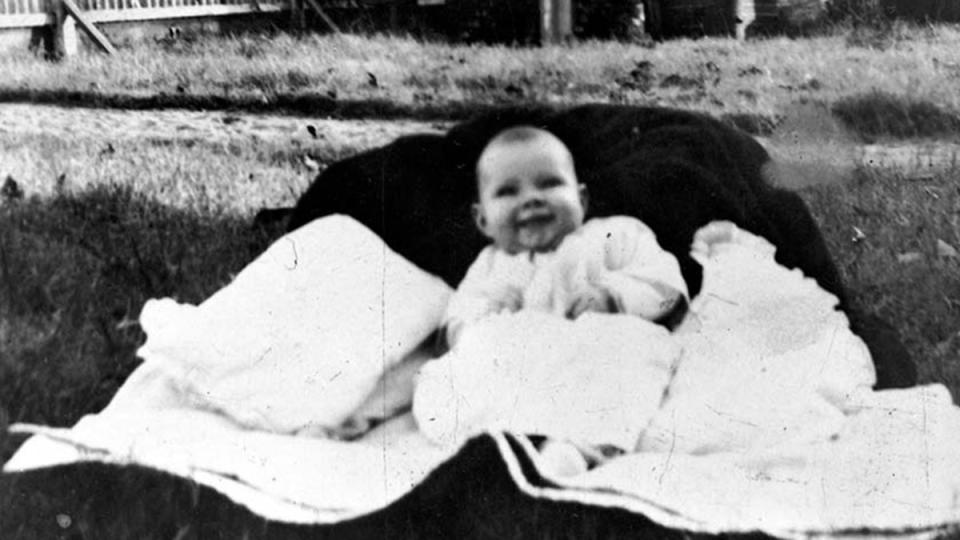
Two things that Mrs. Carter remembers as being especially significant as she was growing up: dust and God. "Dust was a prominent part of our life," she writes in her memoir. "Billows of red dust engulfed us every time a car passed or the wind blew. The only paved road in town was the main highway that went to Americus. We lived on a heavily traveled dirt road, and the dust would settle on the front porch and seep into the house." Of God she writes: "God was a real presence in my life, especially in those revival times. We were taught to love Him and felt very much the necessity and desire to live the kind of life He would have us live, to love one another and be kind to and help those who needed help, and to be good."
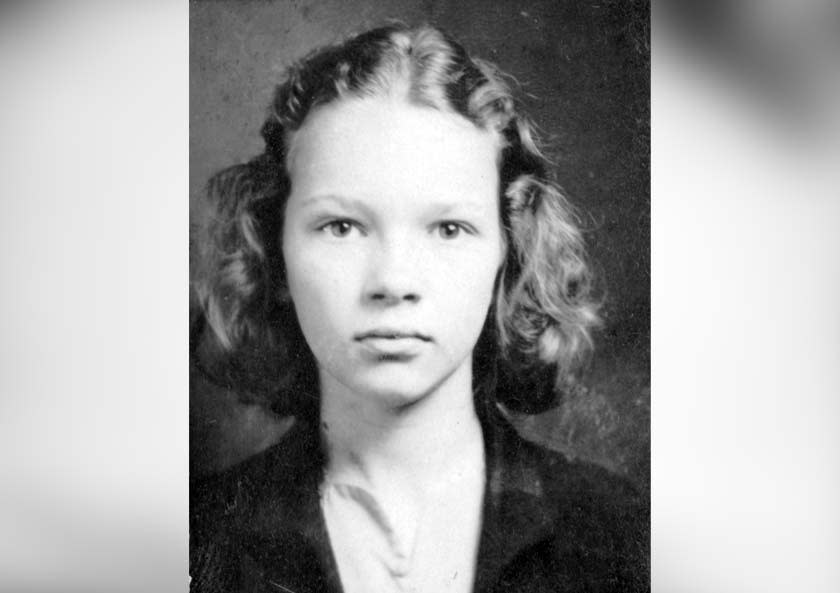
She remembers her father as "a tall, handsome man with dark curly hair. He drove the school bus, worked in one of the mercantile stores in town on weekends, owned an auto repair shop, and ran his farm on the outskirts of town." Rosalynn's family lived in poverty, although she later says that she and her siblings were unaware. She remembers that "times were hard then, not only for us but for everybody. My father lost his nest egg, one thousand dollars, when the Plains bank failed in 1926. And soon after my first brother was born in 1929, the stock market crashed in New York. As children, however, we were unaware of any hardship."
Rosalynn’s father was diagnosed with leukemia when she was 13 and he had a long, slow decline before passing away. She remembers of that time: "I don't think I have ever felt so sad. I thought he was suffering because of the mean thoughts I'd had about him in the past, the somehow I was part of the cause of his illness." She continues: "The night it was clear that Daddy was going to die, Jimmy's mother came to take me to her house to spend the night with Ruth [Rosalynn's best friend]. I don't remember seeing Jimmy that night — I wasn't interested in him then — but I remember that I was relieved to get away from home."
In the years after her father's passing, her mother "did what had to be done" and took in sewing for others with Rosalynn's help. "Mother depended on me even at that early age...I felt very sorry for myself at times, always having to be so grown up," she wrote in her memoir. "But I wasn't. Underneath I felt very weak and vulnerable. I had lost much of my childhood enthusiasm and confidence." She describes having been able to always achieve what she set out to do. Until her father's passing. "I could do anything except the most important thing: I couldn't keep my father alive. I had prayed and prayed for him to get better, and because of those prayers, I'd expected him to get better. But he hadn't."
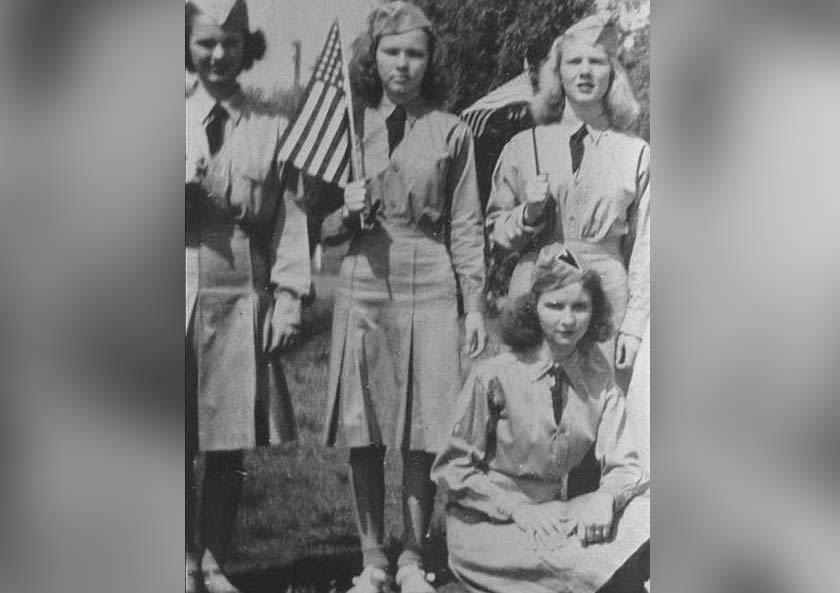
She remembers slowly regaining her confidence in the wake of her father's death: "At school, where everybody played basketball, I was thrilled when I made the first team. I visited my friends and spent more and more time with Jimmy's sister Ruth." After the bombing of Pearl Harbor on December 7, 1941, Rosalynn remembers something shifting, as the superintendent of their school started more actively encouraging the student body to "make something of our lives." "The only realistic for girls at that time was as housewives or schoolteachers," she remembers, but her school superintendent's "ambitions for us fired my imagination" and Rosalynn started dreaming of a future beyond Plains.
Rosalynn and Jimmy's courtship
After finishing high school, Rosalynn enrolled at Georgia Southwestern College, where she could continue to live at home and commute. 1945, Rosalynn remembers was the year she "fell in love with Jimmy's picture." The Carters met through Jimmy’s sister, Ruth, who was Rosalynn’s close friend at the time. When Rosalynn saw a photo of Carter on Ruth’s bedroom wall she "couldn't keep my eyes off the photograph of her idolized, older brother pinned up on her bedroom wall. I thought he was the most handsome man I had ever seen." Although she had known Jimmy as long as she could remember, there was something about that photo that had her seeing him in a whole new way.
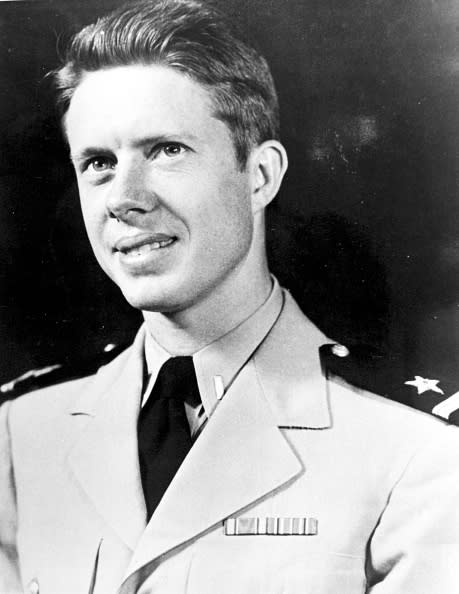
Both devout Southern Baptists, the two soon began dating after spending time together at a picnic outing arranged by Ruth in the summer of 1945. Of the afternoon, Rosalynn writes: "This time Jimmy paid attention to me, teasing me all day about everything, especially about the way I made my sandwich, with salad dressing instead of mayonnaise, and with the pieces of bread not matching...I discovered I could talk, actually talk, to him. I'd always been very shy and quiet, and I was worried that I'd be speechless. But I wasn't."
The two kept in touch by mail during the late summer and fall, and then were reunited for Christmas. "On one of his last nights at home, he proposed to me. and I turned him down," Rosalynn wrote. "It was all too quick. I wasn't ready to get married so soon." After Christmas, Jimmy continued to write to Rosalynn from Annapolis. When they got together over George Washington's Birthday weekend, Jimmy proposed again and Rosalynn accepted. "I think I had always secretly wanted to get out of Plains, and now I couldn't wait," she wrote. "Jimmy teased me about it, saying that was the only reason I was marrying him."
The couple were married in a small, private ceremony not long after Jimmy's graduation from the Naval Academy on July 7, 1946 when she was 18 and he was 21. “When we got married, I think I was kin to everybody that Jimmy wasn’t,” Rosalynn wrote. “Once we got married, we were kin to everybody in town.” The marriage canceled Rosalynn's plans to attend Georgia State College for Women, where she had planned to study interior design.
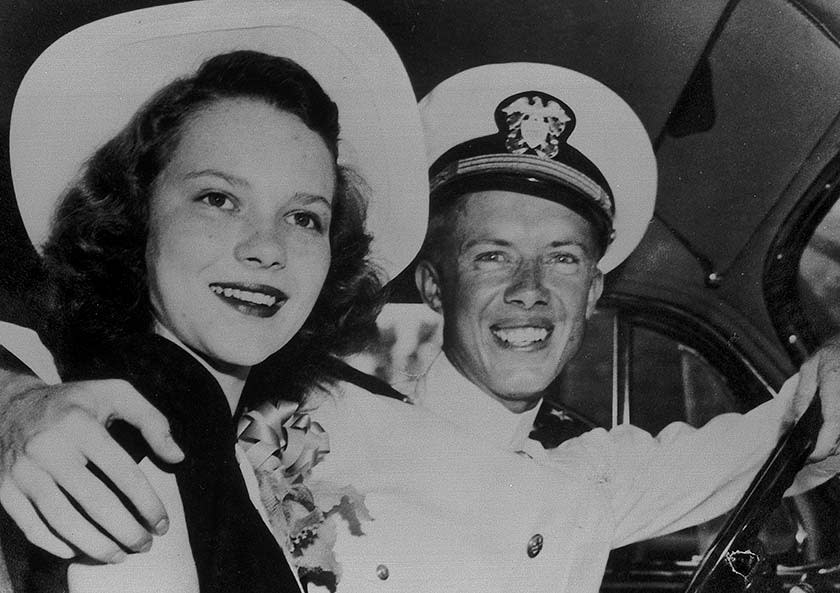
The newlyweds begin life together
The newlyweds moved to Norfolk, Virginia — Jimmy’s first duty station after graduation from the Naval Academy. On July 3, 1947, they welcomed their first son, John William Carter. She remembers, "it was difficult adjusting...to being totally tied down, being totally responsible for someone else twenty-four hours a day. At home, there was always someone to help with newborns — grandmothers and other family members. But in Norfolk, I had no one."
Being a Navy family, this was a feeling that was to recur as they were always on the move: In fact each of their four children ended up being born in four different states: John William in Virginia, James Earl III in Hawaii, Donnel Jeffrey in Connecticut, and Amy Lynn in Georgia.
When Jimmy’s father died in 1953, "it was not too long before I realized the handwriting was on the wall. And I couldn't bear it. After his father's funeral, Jimmy told me he had decided to leave the Navy and return home," she wrote. "I argued. I cried. I even screamed at him. I loved our life in the Navy and the independence I had finally achieved."
Despite Rosalynn's protests, the couple returned to Plains to run the family peanut business. "I was miserable," she wrote. "We moved into a new government project that was home for about ten families. We qualified easily: We had no income." Rosalynn soon started working for business full time, assisting front-office duties like keeping the books. They soon got the business thriving, saved up their pennies and bought a house in the country.
Public life in Georgia
After becoming very involved with all levels of local politics, Jimmy decided to launch a political career in the early 1960s, winning a Georgia state Senate seat in 1962. Rosalynn remembers of this time: "I worked days at the warehouse, handled Jimmy's state senate correspondence at night, and somewhere in between did the housework with the help of Jimmy and the boys. I was struck by how much my life had changed, how frivolous some things seemed that had once been so important."
Rosalynn gave birth to their last child, Amy Lynn, when she was 40. "If I had known then what I know now about the risk of having a baby so late in life, I would have been anxious. But I was blissfully ignorant as I lay in my hospital bed, luxuriating in an indescribable feeling of satisfaction." After three boys, they finally had their little girl.
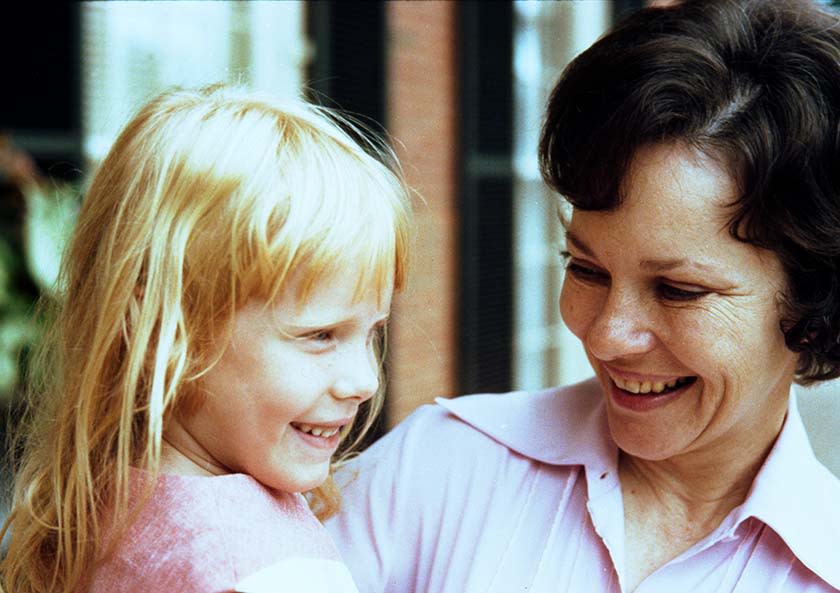
On April 3, 1970, Jimmy announced his second candidacy for governor of Georgia, and Rosalynn knew she had to hit the campaign trail. "The worst part was saying goodbye to Amy," she wrote. "She was only two, and so dependent on me. I didn't want to miss a single day of her life. But I also knew I had to campaign." After a grueling few months of campaigning, Jimmy would go on to win the Governor's seat in 1970, becoming the 76th governor of Georgia.
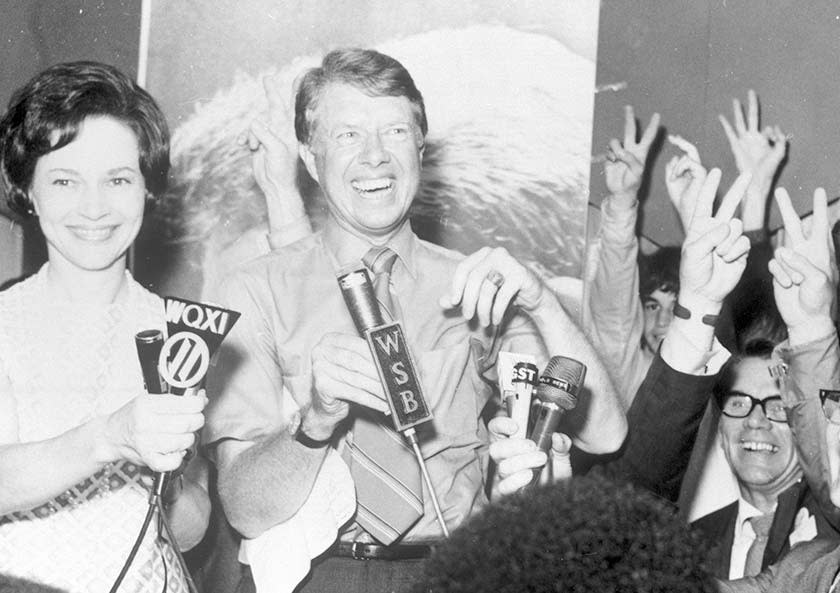
Life in the Governor's Mansion was both thrilling (it was wonderful to have her whole family back together in such a beautiful home) and exhausting (there were seemingly endless public tours of the mansion). At one point the various pressures of public life became too great for her to bear, she remembered Ruth's earlier counsel to give up one's burdens to God. Listening to a friend speaking in a Bible class for incarcerated men, she heard the words, "He wants to take away our problems and cares, and He will — if we'll only let Him." She writes that it finally struck her: "If we'll let Him. There it was. That's what was wrong. I'd clung to all my problems and not let them go." She describes this moment as a turning point: "That experience and that lesson saved my life. I have been in many situations since then that were difficult and that could have been very lonely and defeating, but I am constantly aware that God is with me to help me through the difficult times."
As Georgia's first lady, Rosalynn decided to focus her attention in the field of mental health. Jimmy appointed her to the Governor's Commission to Improve Services for the Mentally and Emotionally Handicapped. She toured many state facilities and was struck by the terrible conditions in many. She remembers touring Georgia's main state hospital for children and finding it a "devastating experience." Many of the Commission's recommendations were approved and became law. She later described her efforts for mentally disabled children her proudest achievement as First Lady of Georgia.
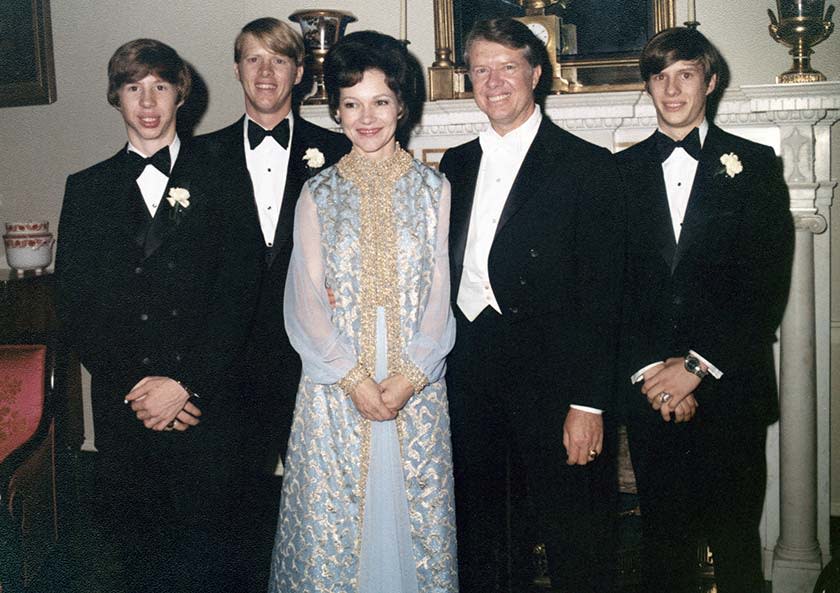
All in all, she wrote that "it was in the Governor's Mansion that I realized that people are just people, no matter who they are or how famous or powerful or influential. They have simply more experience or more opportunities or a special talent, and I was not as intimidated as I thought I would be." She recounts spending time with luminaries like Oral Roberts, Hubert Humphrey (with Amy on his lap!), Ethel Kennedy and Margaret Mead.
Life on the road to the White House
When her husband's gubernatorial term ended in January 1975, Rosalynn, Jimmy and Amy Carter returned to Plains. Jimmy had already announced his plans to run for President of the United States. Rosalynn returned to the campaign trail and spent a grueling 18 months knocking on doors and shaking hands, this time on a national quest to gather support for her husband. She remembers having to "muster up the courage and intrude — on meetings, events, carnivals, anyplace people gather." She campaigned alone on his behalf in 41 states and remembers covering 105 communities in Iowa alone. She visited convalescent homes, nursing homes and mental heath centers and rehabilitation programs for the handicapped. During the 1976 election cycle, journalists dubbed Carter the "steel magnolia" for having a fragile and feminine appearance that concealed a "tough as nails" interior.
When Jimmy won the Democratic primary in June of 1976, Rosalynn remembers returning to Plains at 3 in the morning to cheering crowds of supporters. "What a moment it was!" she writes. "And how good to share it with the people who meant the most to us, in the place to which we always returned—Jimmy Carter, peanut farmer, community leader, state senator, governor of Georgia, and soon to be the Democratic candidate for the President of the United States!"
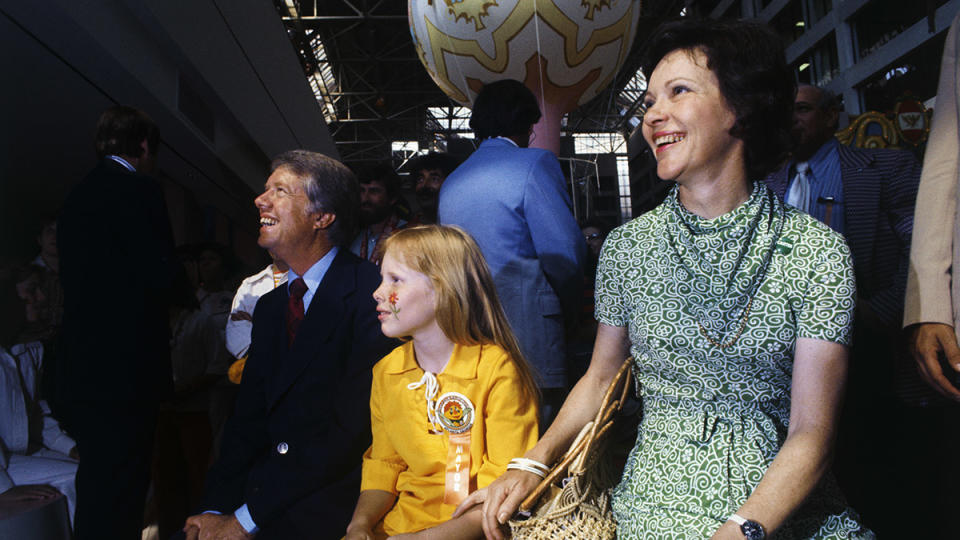
She remembers a similar moment almost six months later on November 2 when the telephone call came from the governor of Mississippi with the news that Mississippi was going for Carter, putting him over the top to win the presidency over then President Gerald Ford. "Dawn was breaking when we finally reached Plains," she wrote. "I saw the sun, looked at Jimmy and tears rolled down both our cheeks. It was a new day and a new beginning both for us and for our country. I had never felt so proud."
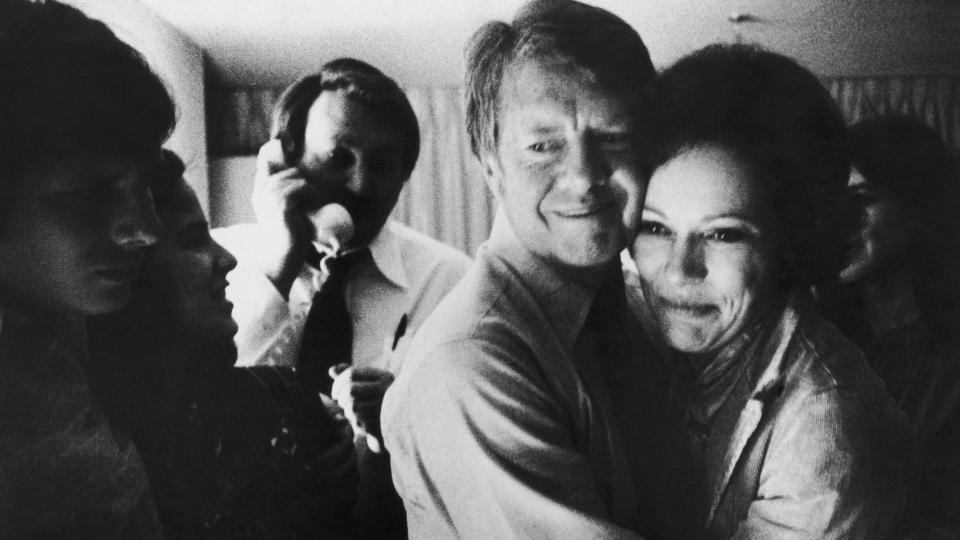
Fast forward several months to the morning of the inauguration, she writes: "It's time to dress, and warmly. For good luck, I put three small crosses on the gold chain around my neck, one each for Amy, our grandson, Jason, and hte new grandbaby yet to be born. For warmth, I put on my boots and my knee-length knit underwear. It doesn't seem like the most stylish way to dress for your husband's inauguration, and I laugh at myself a little as I bundle up." Pragmatic and humble even on the morning of their greatest achievement.
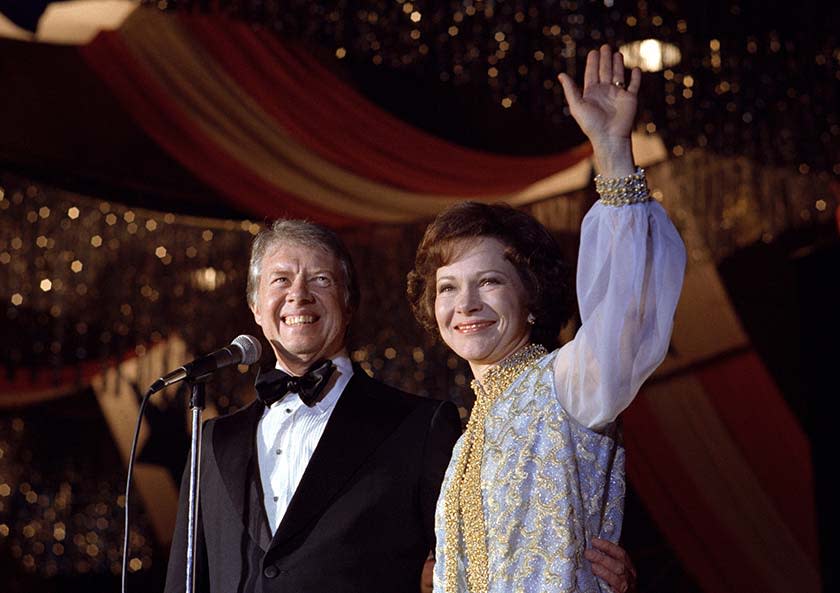
At the end of the inaugural day's festivities, she writes: "I am still numb from the whole experience the day and what it really means. It is a heady feeling to hold the Bible while your husband takes the oath of office, to receive applause and cheers from the huge crowds, and to know that history will record everything you did that day."
LIfe in the White House
When Jimmy moved into the Weight House, so did much of the family! "The living arrangements we had chosen were perfect for our family," she wrote. With Amy on the second floor with the President and the First Lady, Jeff and Chip and their families on the third floor, with a nursery all ready for the new baby. Her daughter, Amy, attracted much public attention, but handled it well. Other members of the family, including son Jack and his wife and children, were frequent visitors.
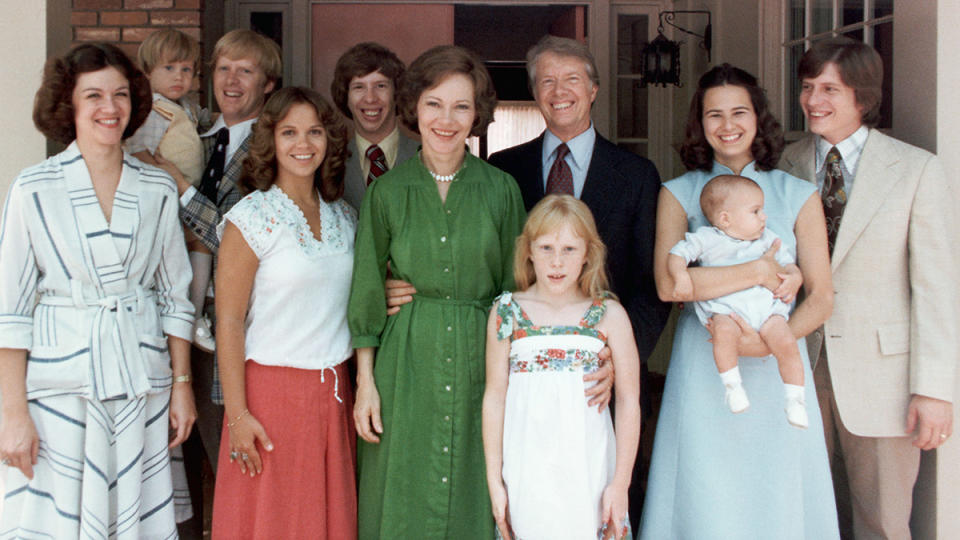
Being First Lady was a challenge — as it would be for anyone. “At the beginning, she was imprisoned by her shyness,” E. Stanly Godbold Jr., a Carter biographer, said in an interview with the New York Times. “Once she started breaking out of her shell, she piggybacked her career onto her husband’s. Then she had a foot in both worlds, the liberated career woman as well as the supportive spouse.”
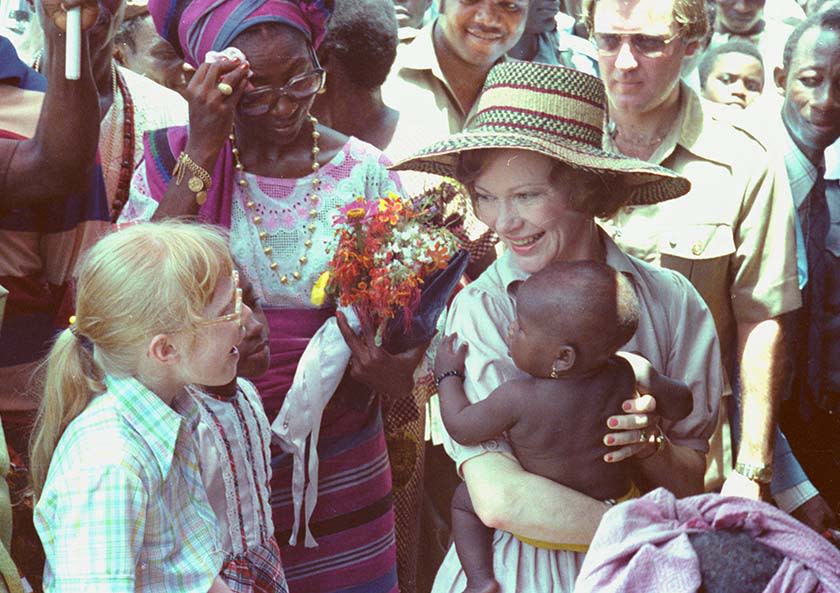
Rosalynn was the first First Lady to keep her own office in the East Wing. With her nudge, Congress formally recognized the office of the first lady as a federal position and provided funding for a staff. Rosalynn became the first presidential wife to carry a briefcase daily to a White House office. Amid the sinking approval ratings of President Carter, Rosalynn maintained high favorable viewpoints in the eyes of the public, and at one point was tied with Mother Teresa for most admired woman in the world.
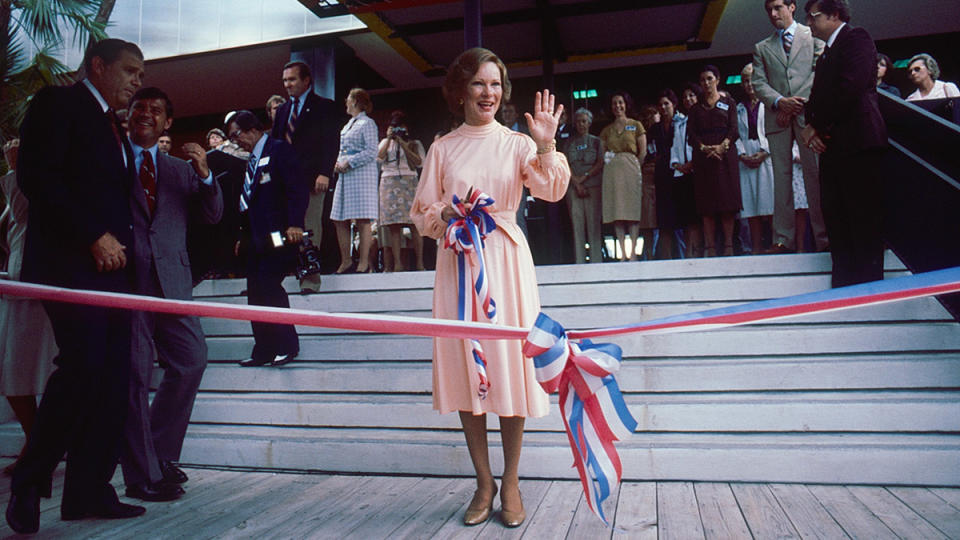
Being under scrutiny was tough at first for Rosalynn, but she got used it over time. "I learned that labels are easy to come by and hard to overcome. I had been called a 'steel magnolia' in the campaign, to which I didn't object, and it was just as well. Once something is printed, it just repeats and repeats," she wrote. "By the end of our first year in Washington I found myself being described as 'fuzzy'—which is better than having a bad image, but not as good as a good one!" She was relieved when "fuzzy" was replaced with "most powerful" when the photo below started making the rounds.
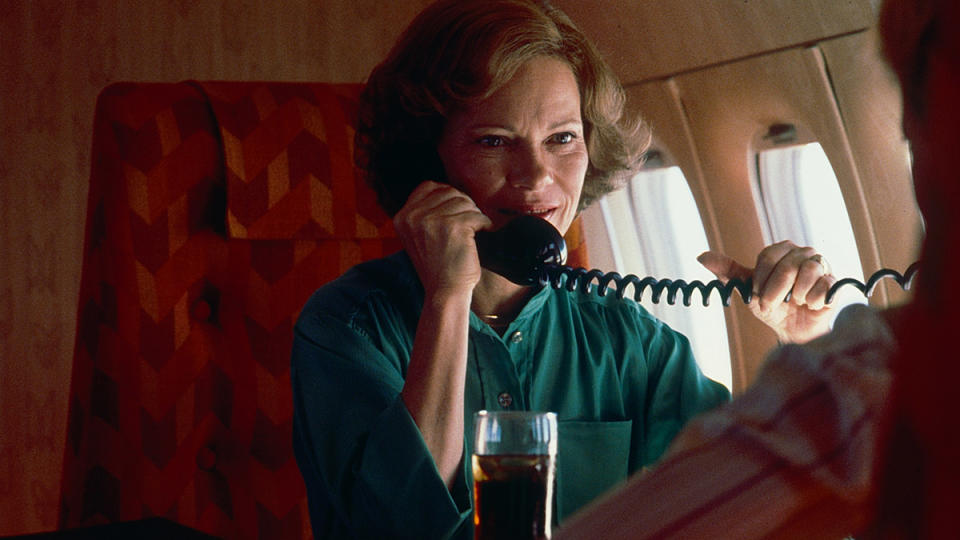
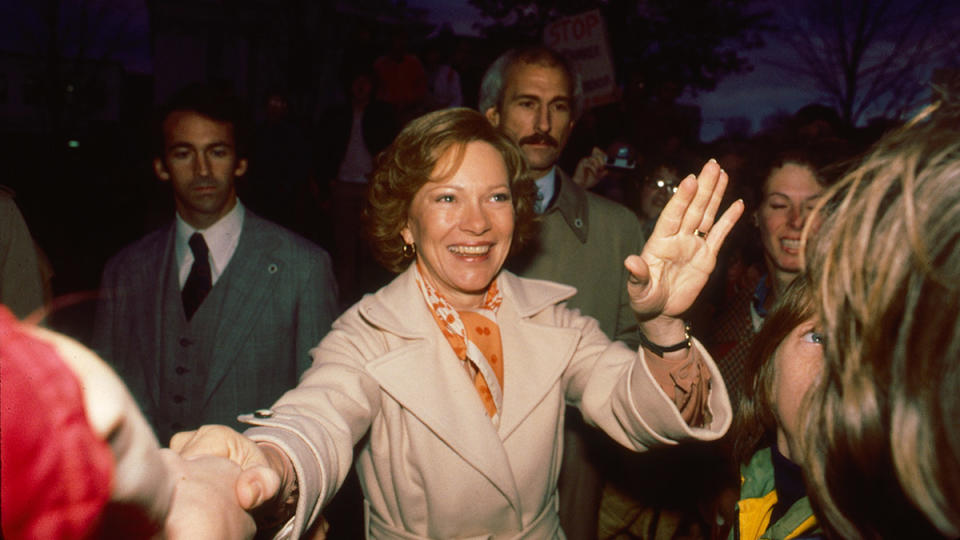
Rosalynn worked tirelessly in the bid to re-elect her husband to a second term in 1980 — a campaign Jimmy lost to Ronald Reagan, a former Hollywood actor and governor of California.
In her memoir, Rosalynn describes being "bitter enough for the both of us" over the loss and that others were equally bitter but she was "the only one who admitted it." As she describes it: "Standing by Jimmy's side that night, listening to his concession speech and looking out over all those people who had worked so hard and long for us, was very painful." She had trouble saying goodbye the White House "emotionally and practically" and describes feeling "very melancholy" as she wondered from room to room.
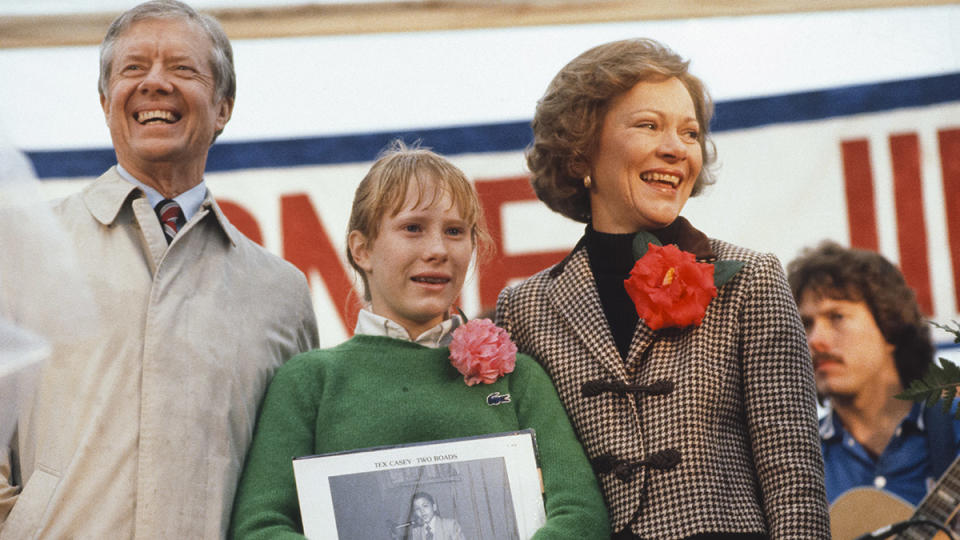
She remembers knowing that when her husband failed in his bid for reelection, "there was no question about where we would go: We would go home," she writes. "I was hesitant, not at all sure that I could be happy [in Plains] after the dazzle of the White House and the years of stimulating political battles. But as we recovered from the exhaustion of our last months in Washington and settled into life at home, we slowly rediscovered the satisfaction of a life we had left long before."
Humanitarian work beyond the White House
And look to the future she did: The next phase of Rosalynn Carter’s life proved to be fruitful. In 1982, the Carters founded the Carter Center, a nonprofit human rights organization forged in partnership with Emory University in Atlanta. Rosalynn wrote several books, including the 1984 memoir First Lady From Plains as well as two books about mental health and one book intended for caregivers.
Advocating for childhood vaccination
In 1991, Rosalynn launched Every Child By Two (known today as Vaccinate Your Family), a nationwide campaign that sought to increase early childhood immunizations along with Betty Bumpers, wife of former U.S. Senator Dale Bumpers of Arkansas. In a preface written in 1994 for her memoir First Lady From the Plains, she explains, "we do a good job in our country immunizing school-age children (97%), but we immunize les than half by age two. Most of the ones who died in the 1989-91 epidemics [of measles] were babies."
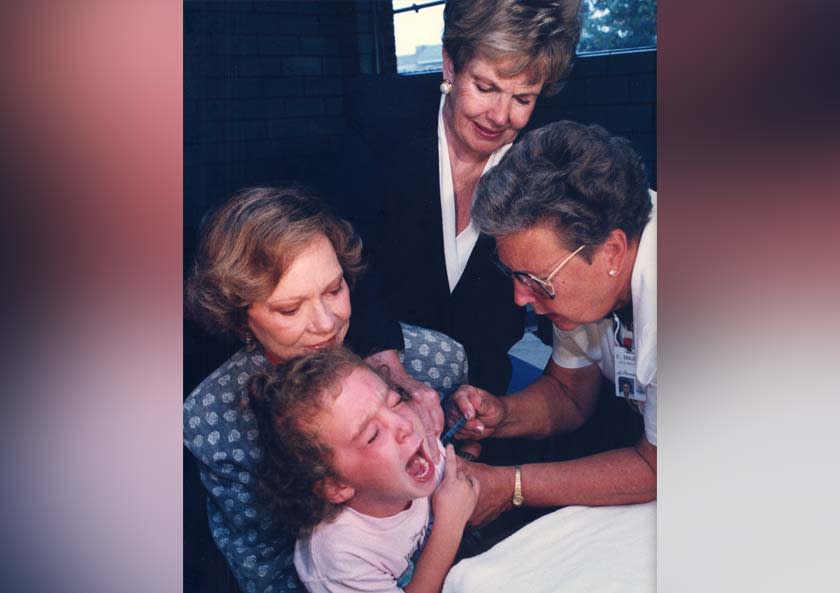
Working to wipe out Guinea Worm
The Carters worked tirelessly to help improve the lives for disadvantaged people oversees. Of these efforts, Mrs. Carter wrote: "Our lives are now as filled, or more filled, than they have ever been. The Carter Center has become more than we could have envisioned." She continued: "Among other health programs, we we are working to eradicate a terrible disease called Guinea Worm, caused by a microorganism found in unclean drinking water" in Africa, Pakistan and India.
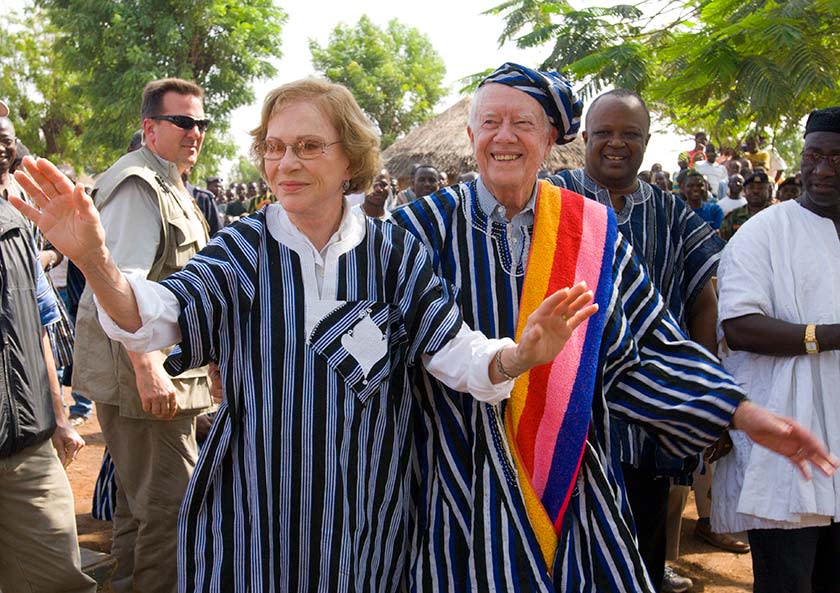
Advocating for the treatment of mental illness
Mrs. Carter held annual symposia on mental health at the Carter Center for more than three decades, uniting experts and advocates for discussions about mental illness, family coping, financing care services, supporting research and reducing the stigma surrounding mental illness. She writes: "I have had a longtime interest in mental health issues and childhood immunization and have been able to continue my efforts in both areas. We have a mental health program at the Carter Center, with a task force of prominent citizens who work with me to help improve the lives of those suffering from mental illnesses." She goes on to explain, "Over the last few months I have been working with Betty Ford on this issue. Betty's major area of concern is in alcohol and substance addiction, so we make a good team."
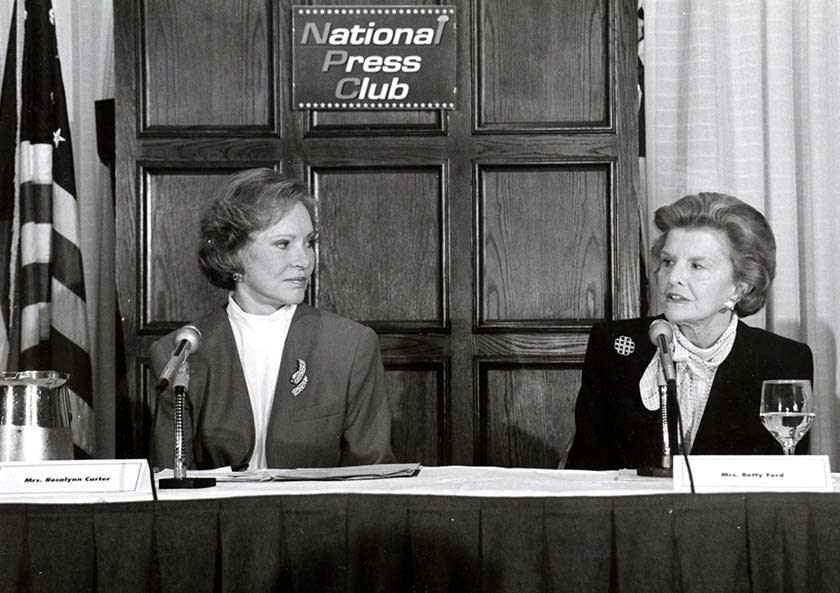
Working to advance Habitat for Humanity
Mrs. Carter also served on the board of advisors for Habitat for Humanity and as an honorary chair of Project Interconnections, both of which aim to provide housing for those in need. "In Habitat we build houses for people in need, but those who get the houses have to work for them, and they have to pay for them," she wrote in the preface to her memoir in 1994. "Owning the homes changes their lives. We have seen it happen over and over again. Habitat homeowners gain not only a home, but also a sense of pride, of self-esteem, of success — often for the first time in their lives,"
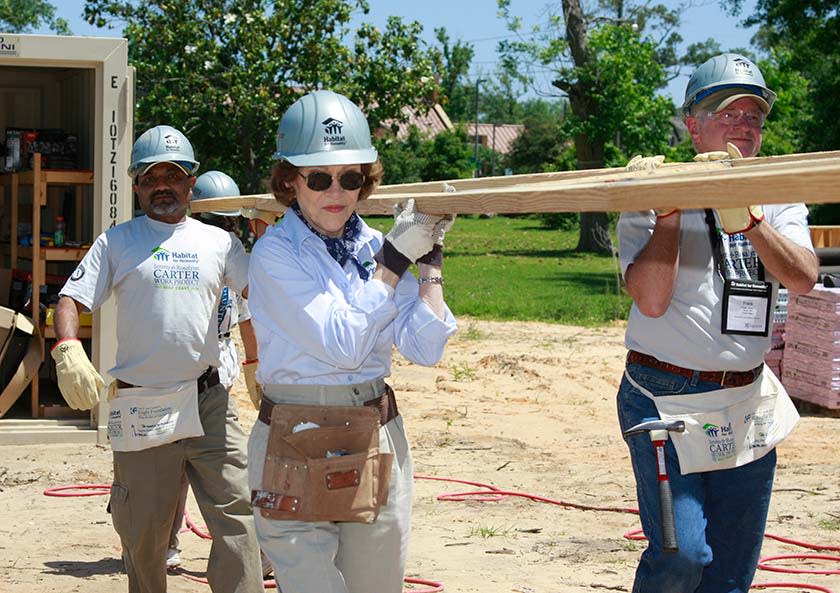
Championing caregivers
In 1987, Rosalynn founded the Rosalynn Carter Institute for Caregivers (RCI) to support the unique needs of caregivers those who selflessly cared for family and friends; and build on her belief that everyone is a caregiver now, has been a caregiver, or will either be or need a caregiver in the future. "The Institute's purpose is to help family and professional caregivers who care for mentally or physically disabled people or the elderly," she wrote. RCI began by offering hands on programs to caregivers in Georgia, and over the last 30 years the institute has grown to support all unpaid caregivers, which number more than 55 million people in the United States. Her efforts fostered the institute’s national expansion, increased awareness of the challenges facing family caregivers, and has positioned caregivers as a vital part of our nation’s public health system.
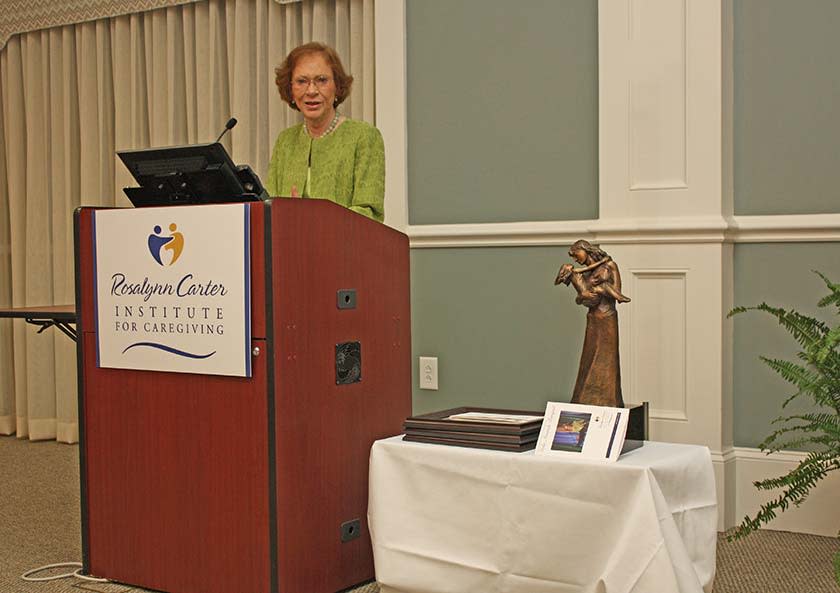
Acknowledgement for altruism
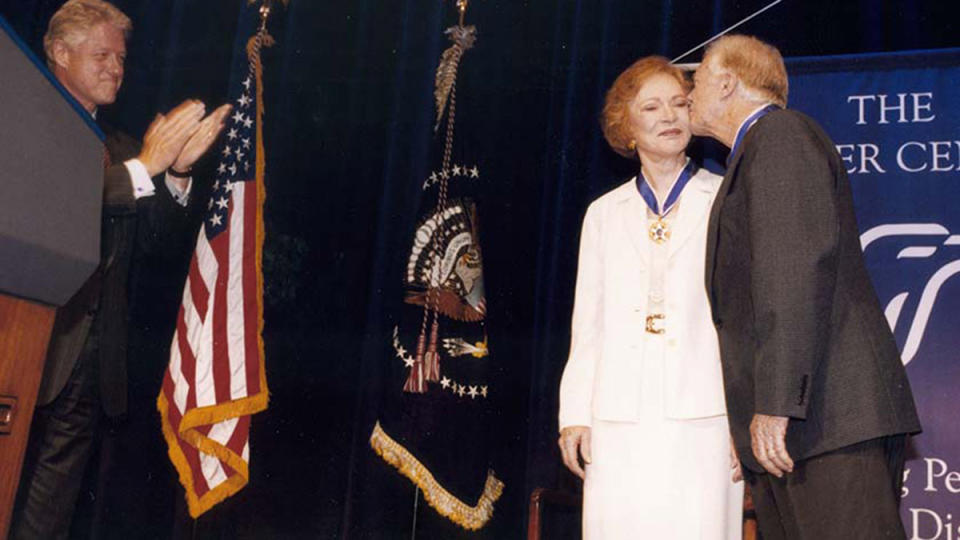
In 1999, the Carters jointly received the Presidential Medal of Freedom, the nation’s highest civilian honor and one rarely bestowed on a husband and wife.
In a 2013 interview with US TV network C-SPAN, Rosalynn said: "I hope our legacy continues, more than just as first lady, because the Carter Center has been an integral part of our lives.
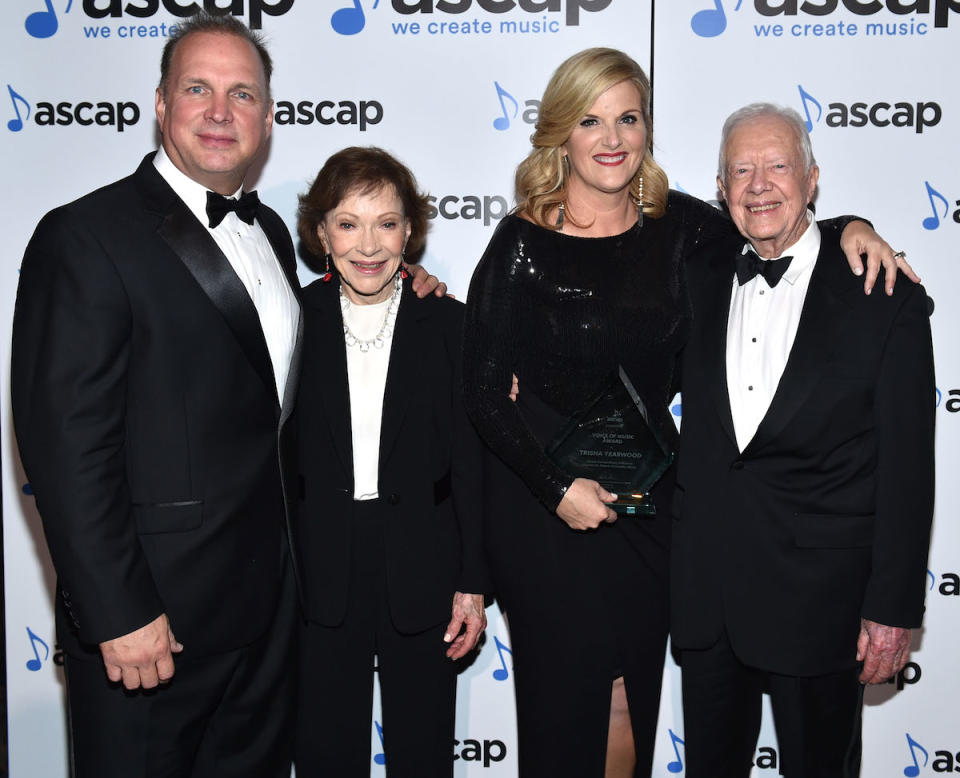
"And our motto is waging peace, fighting disease and building hope. And I hope that I have contributed something to mental health issues and help improve a little bit the lives of people living with mental illnesses."
Returning home
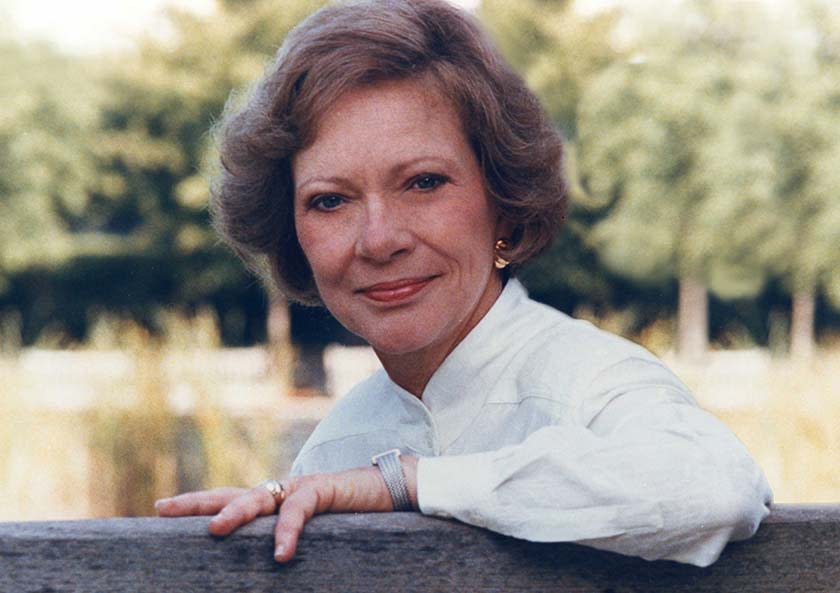
The Carter Center announced on Feb. 18 this year that Jimmy Carter would live out his final days at their home in Plains. Rosalynn stayed with him there, at the small one-story ranch house where, except for their four-year detour to the White House, the couple had lived since 1961. "Plains is still special to us," she wrote in 1994. "We do a lot of things, go a lot of places, but Plains is home, and we always come home."
Mrs. Carter’s dementia had blurred some of her memories, her grandson Josh Carter told The Times in August, but she never forgot who her husband was.
They still held hands.
For more on those who we've lost recently:
The Vibrant Life of Suzanne Somers in 16 Rare Photos
Matthew Perry: Remembering the ‘Friends’ Star’s Early Life in 15 Rare Photos
The Last Few Years of Tina Turner’s Life Were Her Happiest — Here’s Why

